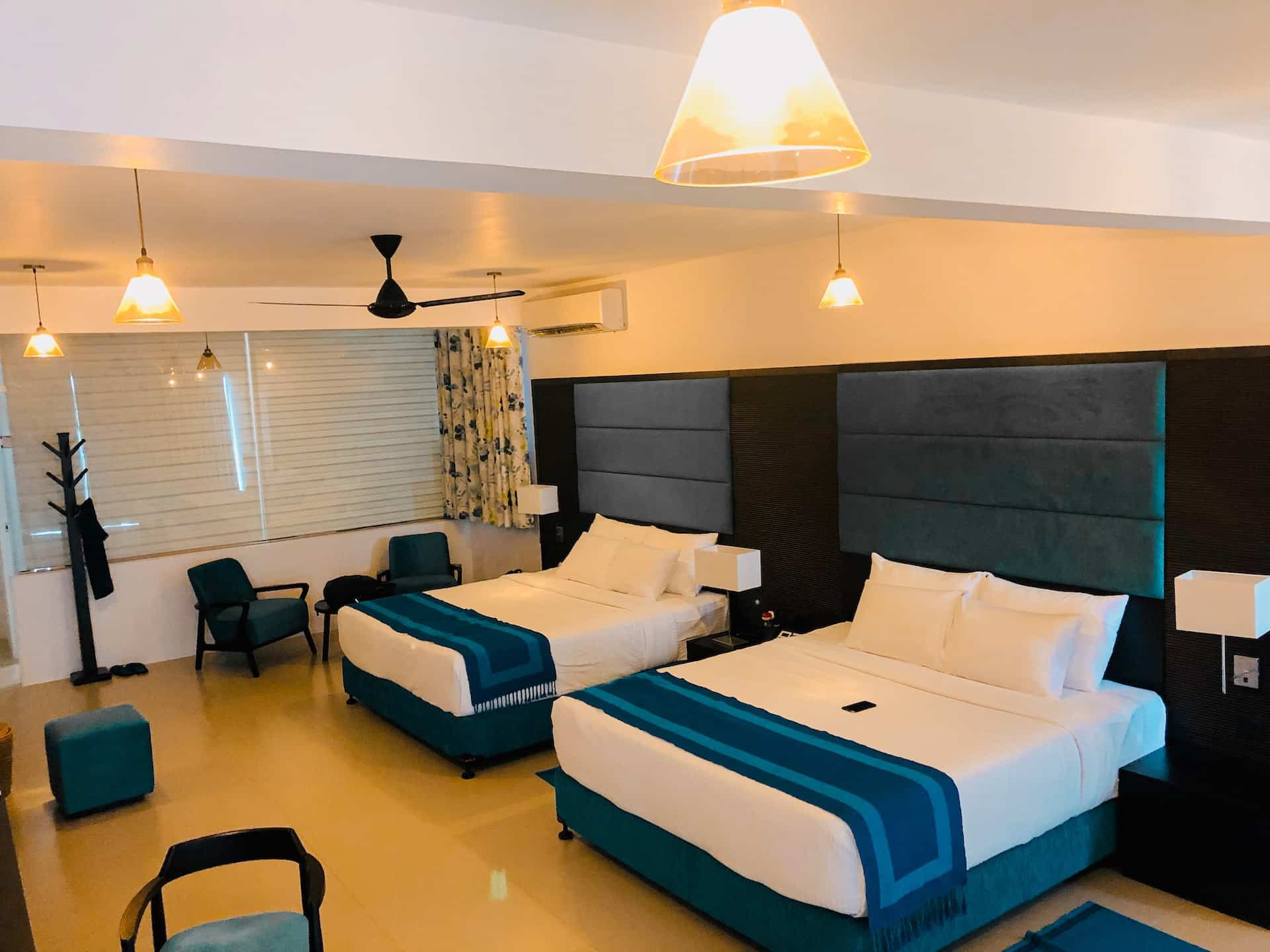If you’re like most business travelers, you dread jet lag. The fatigue, the disrupted sleep schedule, and the general feeling of being out of sorts can really put a damper on your trip. But there are ways to minimize the effects of jet lag and stay healthy and energized throughout your trip.
You can avoid jet lag on business trips by slowly adjusting your sleeping schedule to the new time zone, sleeping on the plane, avoiding caffeine/alcohol, staying hydrating, and eating nutrient-dense/healthy foods.
Jet lag usually lasts just a few days, but following our tips below can help you prevent and minimize the fatigue you might feel during your business travels. Read on for the 12 best tips to help you avoid jet lag on your next business trip.
What Is Jet Lag?
Jet lag is a condition that can be caused by traveling across multiple time zones. It is characterized by fatigue, insomnia, and other symptoms that make it difficult to adjust to a new time zone.
While jet lag can affect anyone, it is prevalent in business travelers who often travel across multiple time zones for work.
If you’re a business traveler, you know that jet lag can be a real pain. Fortunately, there are some things you can do to minimize its effects, which we’ll cover soon.
Why Jet Lag Happens
Jet lag happens because our bodies are used to a specific daily schedule. This schedule is known as our circadian rhythm.
When you travel across multiple time zones, you can disrupt your body’s natural circadian rhythm. This can lead to that familiar fatigue feeling as if you slept just one hour the night prior.
There are a few factors that can influence how severe your jet lag will be:
- The number of time zones you travel: The more time zones you cross, the harder it will be for your body to adjust.
- The direction of travel: It’s generally easier to adjust to a new time zone if you’re traveling eastward. This is because you’re effectively gaining time. Traveling westward is more difficult because you’re effectively losing time.
- The amount of time you spend in the new time zone: If you’re only going to be in a new time zone for a short period of time, it will be easier to adjust than if you’re staying for an extended period.
- Your age: Older adults tend to have more difficulty adjusting to new time zones than younger adults.
- How you sleep on the plane: If you’re able to sleep on the plane, it may be easier to adjust to the new time zone.
Now that we know what jet lag is and why it happens let’s take a thorough look at the symptoms.
Symptoms of Jet Lag
The symptoms of jet lag can vary from person to person. They can also depend on the direction of travel and the number of time zones crossed.
Some common symptoms of jet lag include:
- Fatigue
- Insomnia
- Irritability
- Headaches
- Constipation or diarrhea
- Dry mouth
- Difficulty concentrating
- Anxiety
- Lots of yawning
Jet lag is a real pain, but there are some things you can do to minimize its effects.
Best 10 Tips to Avoid Jet Lag on Business Trip
Here are the top ten tips to prevent jet lag during your next business trip.
Book a Good Seat on the Plane
When booking your flight, be sure to book a good seat. A window seat will allow you to rest your head against the wall and get some sleep. An aisle seat will give you more room to stretch out your legs.
Choose the seat type and location that is the most comfortable for you and will allow you to get the best possible sleep on the plane.
If you have a choice, choose a flight that arrives in the morning. This will help you to adjust to the new time zone more quickly. If you have to take a red-eye flight, try to sleep on the plane as much as possible.
Appropriate Dress Up
Dress comfortably for the flight. Wear loose-fitting clothes that are comfortable to sleep in. Avoid constrictive clothing, such as jeans or a tight belt.
And definitely don’t wear a suit and tie, even if you have a business meeting right after landing. Your suit will get wrinkly, and you won’t be comfortable. Plus, you can change at the airport when you land.
You may also want to bring a scarf or shawl to use as a blanket. And don’t forget your neck pillow!
Avoid Alcohol and Caffeine
It’s tempting to have a few drinks or a cup of coffee to help you stay awake on the plane. But alcohol and caffeine will actually make it harder for you to sleep.
So, avoid them as much as possible. If you do have a drink, make sure it’s not too close to your bedtime.
Turn off Screens
The light from screens can interfere with your sleep. So, turn off your phone, laptop, and other screens at least an hour before you want to sleep on the plane.
If you must use a screen, consider using blue light-filtering glasses. These glasses will help to reduce the amount of blue light that reaches your eyes, which tells your brain it is daytime and keeps you awake longer.
Carry Sleep Essentials
Pack some essential items to help you sleep on the plane. This might include an eye mask, earplugs, noise-canceling headphones, or a small blanket.
You might also want to bring along some lavender oil. Lavender has calming properties that can help you to relax and fall asleep more easily.
Try to Avoid Napping When you Reach your Destination
If you can, stay awake until it’s nighttime in your new location. This will help you to adjust to the new time zone more quickly.
If you’re exhausted, it’s better to take a short nap than to push yourself too hard and end up grumpy and exhausted for the rest of the day. Just make sure your nap is no longer than 20-30 minutes.
Expose Yourself to Light
Light exposure can help to reset your body’s internal clock. So, as soon as you wake up in the morning, open the curtains and let in some natural light.
You can also use a light therapy box for 30 minutes each day. This is especially helpful if you suffer from jet lag and have trouble sleeping at night.
Or, if it’s nighttime when you arrive, go for a walk outside. The fresh air will also help to wake you up.
Move Around
Sitting in one position for too long can make you stiff and uncomfortable. So, be sure to get up and move around every few hours.
Do some simple stretches in your seat. Or take a walk down the aisle. If you have time before your flight, go for a short jog or do some other exercises to get your blood flowing.
Eat for Energy
What you eat can also affect how jet-lagged you feel. So, be sure to eat foods that will give you energy and help you to stay awake.
Some good options include:
– whole grain bread
– oatmeal
– eggs
– fruits and vegetables
– lean protein, such as chicken or fish
And don’t overeat while you’re traveling. It can throw your digestive tract out of whack. Avoid sugary and processed foods too, which can make you feel sluggish.
Stay Hydrated
Drinking plenty of water is always important. But it’s vital when you’re traveling.
Being dehydrated can make you feel tired and sluggish. So, be sure to drink plenty of water throughout the day.
And avoid alcoholic and caffeinated beverages, which can actually cause dehydration. Instead, stick to water, juice, and herbal tea.
Adjust Your Schedule Slowly
Start adjusting your sleep schedule a few days before your trip, if possible. For example, if you’re traveling from New York to London, start going to bed and waking up an hour later each day.
This will help your body to adjust to the new time zone slowly. And it will make the transition easier on you when you finally make the trip.
Book a Comfortable Hotel Room
Make sure you book a hotel room that will help you to get a good night’s sleep. Look for a room that is quiet, dark, and cool. And make sure the bed is comfortable.
You might also want to request a room that is not near the elevator, pool, or ice machine. These can be noisy and make it difficult to sleep.
Frequently Asked Questions on Jet Lag
Here are some common questions about jet lag.
Does Taking Melatonin Work for Jet Lag?
Melatonin is a hormone that helps to regulate sleep. Taking melatonin supplements can help you to fall asleep more easily and stay asleep longer.
It’s especially effective if you suffer from jet lag and have trouble sleeping at night. Just be sure to take it at the right time. If you take it too early, it can actually make it harder to fall asleep.
When Will Jet Lag Go Away?
Most people start to feel better within a day or two. But some people may experience jet lag for up to a week or more.
If you’re still feeling jet lag after a week, you must talk to your doctor. There may be an underlying medical condition causing your symptoms.
How Do You Trick Your Brain to Avoid Jet Lag?
You can trick your brain into avoiding jet lag in a few different ways.
One way is to adjust your schedule slowly before you make the trip. For example, if you’re traveling from Las Angeles to New York a week before your trip, you can go to bed and wake up an hour later each day.
This will help your body to slowly adjust to the new time zone.
Another way is to expose yourself to natural light when you arrive at your destination. This can help to reset your body’s internal clock.
If it’s daytime when you arrive, go outside and walk around for a bit. And if it’s nighttime, open the curtains and let in as much light as possible.
You can also try to avoid napping during the day. This can help you to stay awake and adjust to the new time zone more quickly.
Does Flying Business Class Reduce Jet Lag?
There is some evidence that flying business class can help reduce jet lag.
One study found that people who flew business class had less jet lag than those who flew economy class.
The theory is that business class passengers have more leg room and can sleep more easily on long flights. This helps them to arrive at their destination more rested and less jet lagged.
If you’re concerned about jet lag, flying business or even first class may be worth the extra cost.
When Should I Call the Doctor?
If you’re still feeling jet lagged after a week, it’s important to talk to your doctor. You might have a medical condition or illness causing fatigue.
Your doctor will likely ask about your travel plans and how you feel. They may also order blood tests or other tests to rule out other conditions.
Conclusion
Jet lag can be a real pain, especially if you’re traveling for business. But by following these tips, you can minimize its effects and make your trip successful.
Don’t forget to adjust your schedule slowly before you travel, book a comfortable hotel room, and expose yourself to natural light when you arrive. And if all else fails, remember that most people start to feel better within a few days.
Do you have employees traveling frequently for business? Globeo can help get you the best long-term lodging rates no matter where your business takes you.








